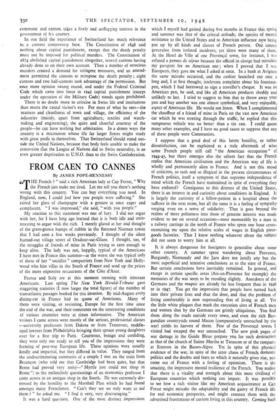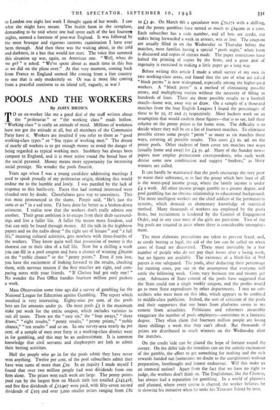FROM CAEN TO CANNES
By JAMES POPE-HENNESSY WTI HE French ? " said a rich American lady at Cap Ferrat, " Why I the French just make me tired. Let me tell you there's nothing wrong with this country. You can buy everything you need. In England, now, I could feel how you people were suffering." She raised her glass of champagne with a gesture at once eager and complacent. " I was impressed," she said, " with you people."
My reaction to this statement was one of fury. I did not argue with her, for I have long ago learned that it is both idle and unin- teresting to argue with the rich. I merely glared at her and thought of the grass-grown humps of rubble in the flattened Norman towns that I had seen a few weeks previously. I thought of the silent burned-out village street of Oradour-sur-Glane. I thought, too, of the struggles of friends of mine in Paris trying to earn enough to keep alive. The lady was not, happily, typical of the Americans I have met in France this summer—at the worst she was typical only of those of her " socialite" compatriots from New York and Holly- wood who hire villas in the South of France and send up the prices of the more expensive restaurants of the C,Ote d'Azur.
France and Italy are at this moment teeming with itinerant Americans. Last spring The New York Herald-Tribune gave staggering statistics (I now forget the total figure) of the number of transatlantic passages booked for this invasion. By mid-August every dining-car in France had its quota of Americans. Many of .them were visiting, or revisiting, Europe for the first time since the end of the war, and their conunents on the contrasting conditions of various countries were at times informative. The American visitors I came across were mostly of the serious, professional clasies —university professors from Dakota or from Tennessee, middle- aged lawyers from Philadelphia bringing their spruce young daughters over for a first trip to Paris. Courteous, benign and confiding, they were only too ready to tell you of the impressions they were forming of post-war European life. These opinions were usually kindly and impartial, but they differed in value. They ranged from the undiscriminating comments of a couple I met on the train from Besancon (who told me that Cambridge had been quiet, but that Rome had proved very noisy—" Myrtle just could not sleep in Rome ") to the melancholy questionings of an economics professor I came across in an antique shop in the South. He was extremely dis- tressed by the hostility to the Marshall Plan which he had found amongst many Frenchmen. " Can't they see we only want to aid them ? " he asked me. " I find it very, very discouraging."
It was a hard question. One of the most distinct impressions
which I myself had gaiited during five months iri France this spring and summer was that of the critical attitude, the species of mental resistance to the United States and to American influence now being put up by all kinds and classes of French person. One cannot generalise from isolated incidents, yet there were many of them. At the Hotel de Ville of one Provencal town, for instance, I was refused a permis de sejour because the official in charge had mistaken my passport for an American one ; when I proved that I was European, they gave me what I asked at once. In a bank at Avignon the same mistake occurred, and the cashier launched out into a long and, I at first thought, irrelevant complaint about his fountain- pen, which I had borrowed to sign a traveller's cheque. It was an American pen, he said, and like all American products shoddy and unlikely to last. I tried to suggest to him that to throw away your pen and buy another was one almost symbolical, and very enjoyable, aspect of American life. He woulci not listen. When I complimented the chauffeur of a friend of mine in Paris on the vast new American car which he was steering through the traffic, he replied that this sumptuous vehicle was no better than a tin can. I could quote many-other examples, and I have no good cause to suppose that any of these people were Communists.
I suppose that a good deal of this latent hostility, or rather dissatisfaction, can be explained as a stale aftermath of what some French people still call " the American occupation" of 1944-45, but there emerges also the salient fact that the French realise that American civilisation and the American way of life is wholly and permanently alien to France. And is not this mood of criticism, so rash and so illogical in the present circumstances of French politics, itself a symptom of that supreme independence of mind which the French have maintained in spite of everything they have endured? Contiguous to this distrust of the United States, there is an interest in and curiosity about conditions in England. It is largely the curiosity of a fellow-patient in a hospital about the sufferer in the next room, but all the same it is a feeling of sympathy verging even on a sense of solidarity. That it goes beyond the realms of mere politeness into those of genuine interest- was made evident to me on several occasions—most memorably by a man in a railway carriage in the north of France who spent one hour cross- examining me upon the relative scales of wages in English piece- goods factories. That I knew nothing whatever about the subject did not seem to worry him at all.
It is always dangerous for foreigners to generalise about some other country. A summer spent wandering about Provence, Burgundy, Normandy and the Jura does not justify any but the most superficial and tentative conclusions as to the state of France. But certain conclusions have inevitably remained. In general, and except in certain specific areas (Aix-en-Provence for example) the memories of the war seem to be receding slightly. Anecdotes of the Germans and the maquis are already far less frequent than in 1946 or in 1947. You get the impression that people have turned back into their private lives and shut the door, and that the problem of living comfortably is now superseding that of living at all. Yet the little white plaques that mark the execution sites of French men and women shot by the Germans are grimly ubiquitous. You find them along the roads outside every town, and even the rich Bur- gundian countryside round Macon (comparatively untouched by the war) yields its harvest of them. Few of the Provencal towns I visited had escaped the war untouched. The new pink pages of war damage in the Guide Bleue prepare you for such destruction as that of the church of Sainte Marthe at Tarascon or of the ramparts at Sisteron in the Basses-Alpes. Yet in spite of this physical evidence of the war, in spite of the utter chaos of Trench domestic politics and the doubts and fears to which it naturally gives rise, you come out of France with a feeling of optimism. There is the amazing, the impressive mental resilience of the French. You realise that there is a vitality and strength about this most civilised of European countries which nothing can impair: It was possible to see how a rich visitor like my American acquaintance at Cap Ferrat might mistake the adaptability and the gaiety of French life for real economic prosperity, and might contrast them with the advertised frustrations of current living in this country. Coming back to London one night last week I thought again of her words. I saw what she might have meant. The health form in the aeroplane, demanding to be told where one had spent each of the last fourteen nights, seemed a foretaste of post-war England. It was followed by the most brusque and rigorous customs examination I have ever been through. And then there was the waiting about, in the cold and darknesS, in a bus that would not start. The voice that summed this situation up was, again, an American one. " Well, when do we go? " it asked. " We've spent about as much time in this bus as we did on the plane over." At that very moment, coming back from France to England seemed like coming from a free country to one that is only moderately so. Or was it more like coming from a peaceful continent to an island still, vaguely, at war



































 Previous page
Previous page